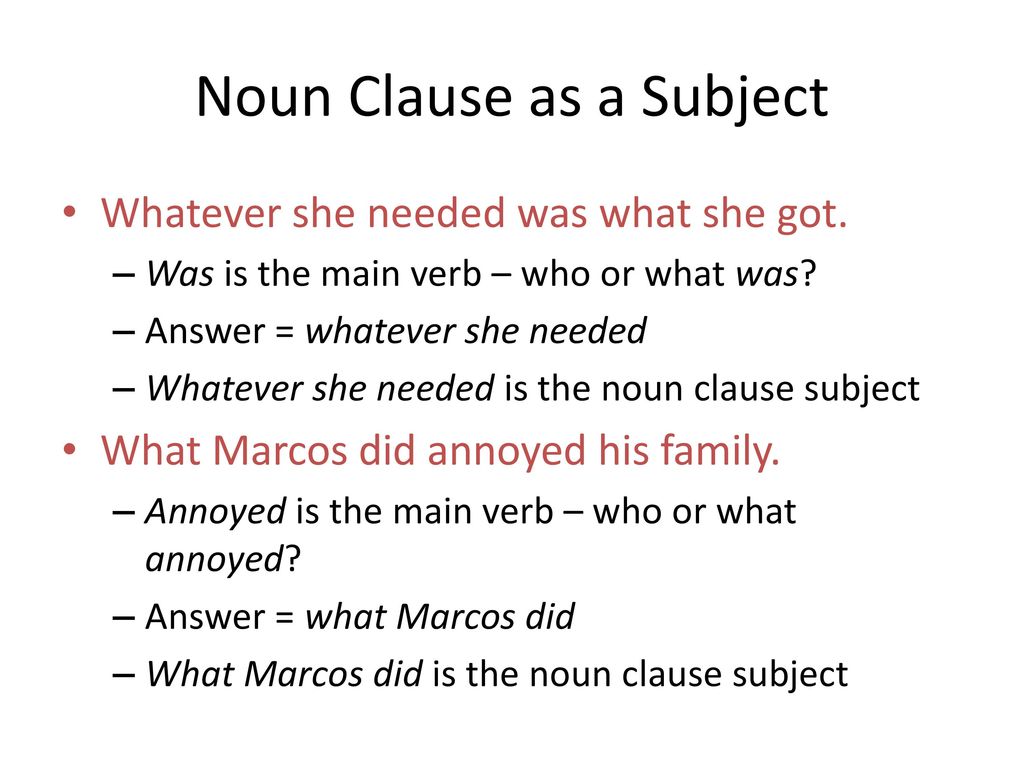What Is Noun Clause / Noun Clauses With Wh Words Voicetube Learn English Through Videos - Let's do a quick review of these two important terms.. A clause is a group of words that forms part of a sentence and that contains a subject and a predicate. A noun clause functions as a noun. Whether he will attend or not. The two forms of noun clauses in the english language are finite noun clauses and nonfinite noun clauses. It follows a linking or copular verb to describe or modify the subject of the sentence.
How to identify noun clause in sentences? The examples below show how they are used noun clauses often use words such as when, what, why, who and other question words, but the speaker may or may not be making a question. A noun clause is a dependent clause that acts as a noun. Just like nouns do, a noun clause names people, things noun clauses have words like; Like all clauses, a noun clause has a subject and a verb.

A noun clause cannot stand alone because it is not a complete thought.
It must always be paired with an independent (main) clause. Noun clauses can act as subjects, direct objects, indirect objects, predicate nominatives. What is a noun clause? A noun clause serves the same purpose as a noun. The noun clauses answer the question what? The verb in a clause can be finite use this pan for the pasta. Just like nouns do, a noun clause names people, things noun clauses have words like; A noun clause usually begins with the following words: Let's do a quick review of these two important terms. For example, if the sentence asks do you know what time we are leaving? the noun clause is what time we are leaving? you can't easily substitute a noun here. As a noun clause does the work of a noun, it can be subject to a sentence, object of a transitive verb, object of a preposition, apposition to a noun, or complement to a linking verb. (here the noun clause what she is doing is the object of the preposition in.) noun clauses as compliments. So, what must luke unlearn?
The examples below show how they are used noun clauses often use words such as when, what, why, who and other question words, but the speaker may or may not be making a question. Whether he will attend or not. Noun clauses are usually introduced by the subordinating conjunctions that, if and whether. A noun clause is a subordinate clause in a complex sentence that acts as a noun. A clause used as a part of speech the relative pronouns are who, which, what, that (= who or which), as (after such or same) and the compound relatives whoever, whichever, whatever.

It is a direct object in this sentence.
Whether he will attend or not. Question words like what, how, when etc., can also be used to introduce noun clauses. It must always be paired with an independent (main) clause. A noun clause is a dependent clause that acts as a noun. It begins with words such as how, that, what, whatever, when, where, whether, which, whichever, who, whoever, whom, whomever. = subject complement of 'uncertainty' describing what is uncertain. Noun clauses generally begin with words such as how, that, what, whatever, when, where, whether, which, whichever, who, whoever, whom, whomever, and why. As a noun clause does the work of a noun, it can be subject to a sentence, object of a transitive verb, object of a preposition, apposition to a noun, or complement to a linking verb. A noun clause is a clause that plays the role of a noun. Noun clauses are a type of subordinate clause. A noun clause is a dependent clause that functions as a noun. English easy learning grammarsentences and clausesa clause is a group of words which contains a verb. A noun clause functions as a noun, which means it can be a subject, direct object, indirect object, object of a preposition, predicate nominative, or noun clauses usually begin with words called relative pronouns such as how, that, what, whatever, when, where, which, who, whoever, and why.
A noun clause is a dependent clause that contains a subject and a verb. It can be the subject or object of a verb. A noun clause cannot stand alone because it is not a complete thought. A noun clause can function as what you have done pleased so many fans. Noun clauses come after the words such as how, that, what, whatever, when, where, whether, which, whichever, who, whoever, whom, whomever, and why.

You don't want to know what karen has planned to trick the boys.
What is a noun clause? A clause that fulfils the same function as a noun | meaning, pronunciation, translations and examples. It must always be paired with an independent (main) clause. Whether he will attend or not. A noun clause is a clause (containing a subject and a verb) that can replace a noun. A noun clause functions as a noun, which means it can be a subject, direct object, indirect object, object of a preposition, predicate nominative, or noun clauses usually begin with words called relative pronouns such as how, that, what, whatever, when, where, which, who, whoever, and why. It is a direct object in this sentence. What is noun clause, example sentences English easy learning grammarsentences and clausesa clause is a group of words which contains a verb. Whatever, whichever, whoever, whomever, how, what, when which, whether, whom, who, why at the beginning. A noun clause is a dependent clause that acts as a noun. A noun clause is a dependent clause that contains a subject and a verb. The noun clauses answer the question what?
